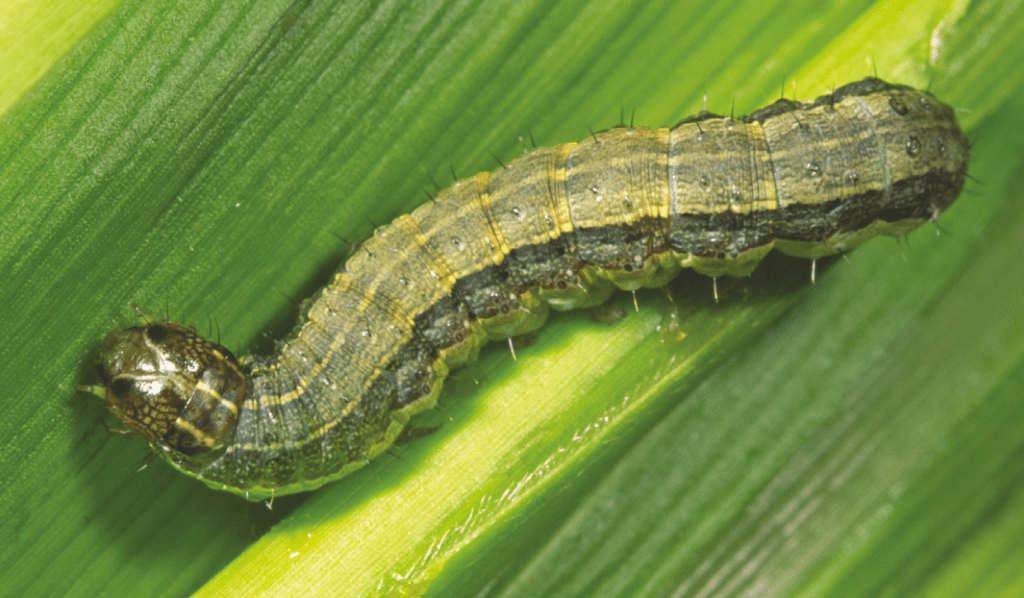Mar 16, 2021Looking Ahead: How to Control Worms in Sweet Corn
Be prepared for pest outbreaks with Radiant® SC insecticide


{Sponsored} Reducing fall armyworm feeding in sweet corn, and maximizing marketable yield, requires a responsive season-long control plan relying on multiple modes of action.
South Florida sweet corn production manager Tom Perryman considers fall armyworm and silk flies his most troublesome pests.
“Fall armyworm are a problem throughout the season,” says Perryman, Hundley Farms, Loxahatchee, Florida. “We use Radiant to control first instar worms and we try to time that application just prior to tassel push.”
Radiant® SC insecticide, a Group 5 insecticide, provides fast knockdown and broad-spectrum control of damaging pests, including fall armyworm.
Proven research
“Larvae can feed on whorls, tassels, silks and ears leading to a yield and grade reduction. Program approaches using rotations of insecticide mode of action are necessary to reduce the chances of insecticide resistance,” says Jawwad Qureshi at the University of Florida’s Southwest Florida Research and Education Center.
In University of Florida studies conducted in 2019 in Immokalee, Florida, rotating insecticide treatments reduced the number of larvae collected and ears damaged as compared with the untreated check.
Untreated sweet-corn plots had 46.25% of ears damaged by fall armyworm, and averaged 1.5 larvae collected per 20 ears of corn.
In comparison, Radiant® SC insecticide applied May 22 with a high-clearance sprayer at a rate of 6 ounces per acre resulted in 6.25% of ears damaged and 0.25 larvae collected per 25 ears of sweet corn.1
In the research, Radiant was included first in an insecticide rotation of Radiant, Lannate® LV, Mustang 1.5 EW and Coragen 20 SC insecticides.
Keys to successful control
Control of lepidopteran pests such as fall armyworm can’t wait. “With our heat and humidity, sweet-corn pest populations increase quickly,” Perryman says.
“If you have fall armyworm populations present in the field, they can increase fast on you,” he says. “When you see 4% present, they are moving quickly. By the next day, when you can get into the field to spray, you are likely already at an 8% or higher worm population.”
Perryman pulls the trigger on insecticide treatments as soon as fall armyworm populations reach 4% of a field’s total pest population.
“Radiant gives us the fall armyworm control we need. It does well controlling worm species,” he says.
Rotation matters
Minimizing insecticide resistance by rotating chemistries is a key component in an Integrated Pest Management (IPM) program. The unique chemistry of Radiant makes it the ideal foundation for the vegetable grower’s IPM program. Positioning Radiant early in the season aids this IPM effort and offers growers an ideal rotational partner.
“Radiant is another tool in our toolboxes for rotational purposes so we are not repeatedly spraying the same pesticides,” Perryman says. “Having Radiant in our rotation helps us hold back our Lannate sprays until the silking stage. That’s important because we only have a few available Lannate sprays per crop year.”
Radiant offers consistent season-long control of tough-to-control insects, including corn earworm, armyworm, western bean cutworm and corn borer, while the translaminar activity of Radiant controls targeted insects outside of the direct line of spray. Radiant also has a short preharvest interval and four-hour re-entry. Radiant also helps preserve populations of beneficial insects that are so important to IPM programs.
Contact your local Corteva Agriscience representative or visit RadiantSC.Corteva.US to learn more about how Radiant® SC insecticide can help protect your crop from damaging worms.
™ ® Trademarks of Corteva Agriscience and its affiliated companies. Lannate® LV is a Restricted Use Pesticide. Lannate® LV is a Restricted Use Pesticide. The EPA-registered label for Lannate LV contains the following statements: “This product is highly toxic to bees exposed to direct treatment on blooming crops or weeds. Do not apply this product or allow to drift to blooming crops or weeds if bees are foraging in (actively visiting) the treatment area.” Lannate LV is not registered for sale or use in all states. Contact your state pesticide regulatory agency to determine if a product is registered for sale or use in your state. Always read and follow label directions.
© 2021 Corteva. CA14-358-025 (04/21)BR CAAG1DELE051
1Qureshi, Jawwad and BC Kostyk. “Control of Fall Armyworm with Labeled Insecticides and Experimental Surfactants in Sweet Corn, Spring 2019.” Arthropod Management Tests 45.1 (2020): tsaa022.














